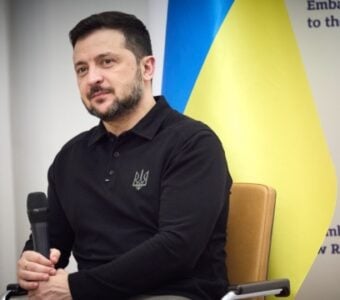European Commission rejects Hungary's request for Russian oil transit through Ukraine

Фото: delo.ua
Hungary and Slovakia tried to involve the European Union in the dispute with Ukraine over the termination of the supply of Russian oil through the Druzhba pipeline, but their attempts failed. The European Commission has delayed its request to call on Kyiv to lift recent sanctions against the Russian oil company Lukoil, which effectively prohibits Ukraine from being used as a transit point for supplies to those countries.
This is reported by the Financial Times.
After Russia's full-scale aggression in Ukraine started, EU countries were prohibited from importing Russian oil from the Russian Federation. However, Slovakia and Hungary were allowed to import Russian oil because oil from Russia is still their main source of energy.
Until now, the Druzhba pipeline, which passes through Ukraine, remained the main supply route to Slovakia and Hungary.
However, in July, Lukoil stopped supplying oil to these countries. This happened after the strengthening of sanctions by the National Security and Defense Council of Ukraine against Lukoil in June 2024. This means a ban on using Ukraine as a transit for oil supply to these countries.
Because of this, both states initiated the arbitration court consultation procedure with the European Commission.
The Minister of Foreign Affairs of Hungary, Péter Szijártó, called the strengthening of sanctions against Lukoil "an unacceptable step on the part of Ukraine, which wants to become a member of the EU" because the ban on transit threatens the supply of crude oil to two EU countries.
He added that this allegedly violates Ukraine's Association Agreement with the EU. The Hungarian minister called Ukraine's decision "unfriendly," considering that Kyiv receives electricity from Hungary.
However, EU trade commissioner Valdis Dombrovskis told the Financial Times that Brussels "needs more time to gather evidence and assess the legal situation."
As three diplomats told the media outlet, at yesterday's meeting of trade representatives of EU member states, 11 countries supported his position, and none of them took the side of Hungary and Slovakia.
One of them stated that the trade agreement with Ukraine includes a security clause that could allow disruption of supplies.
It is not clear what kind of sympathy Hungary was hoping for when it complained to the European Commission about the strengthening of sanctions against Kyiv, given the recent "peace tour" of the country's Prime Minister Viktor Orban, which the European Union condemned.
"Peace" tour of the Prime Minister of Hungary Viktor Orban
After a trip to Kyiv and talks with President Volodymyr Zelensky, Orban unexpectedly visited Moscow and Beijing, then took part in the NATO summit in Washington last week, and also held talks with Trump in Florida.
After that, the Hungarian Prime Minister summarized his tour and presented to the EU leaders his "peace plan" with goals and deadlines regarding the Russian Federation's war against Ukraine. Orban also offered the EU to restore diplomatic relations with Russia.
In turn, the head of the European Council, Charles Michel, responded to the letter with the Hungarian Prime Minister's "peace" plan and criticized Orbán for his self-proclaimed "peacemaking mission" regarding the war in Ukraine.

"Такий у мене був план. Я про це мріяв з четвертого класу": як працює центр реабілітації птахів "Вільні крила"

Building greener future: How one eco-camp in Ukraine teaches local youth to cherish nature and history




















































